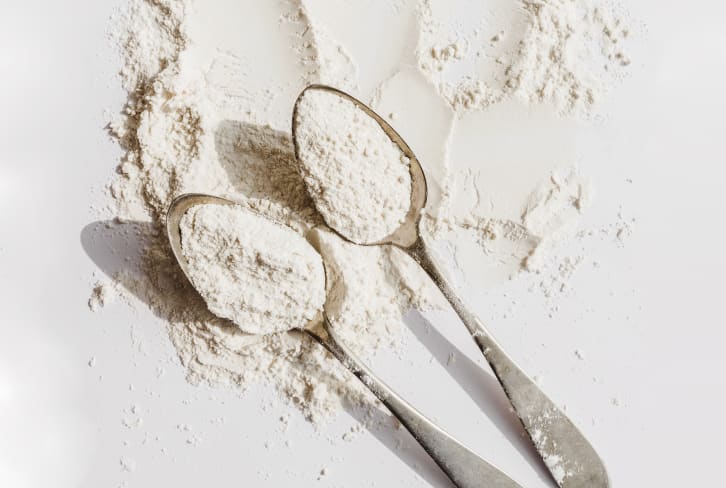Advertisement
3 Leptin Resistance Triggers + How It Affects Healthy Weight Management


In my experience working with patients, there's one very important factor that's often missing in the conversation about healthy, sustainable weight management and metabolism. Enter: hormones (namely, leptin). Here, I explain what leptin is and three causes of leptin resistance that could have a major impact on your overall health.
What is leptin?
Leptin is your "satiety" hormone1. Your own fat cells produce this hormone, and it communicates with your hypothalamus (a part of the brain that regulates your metabolism). Leptin's job is to tell your brain whether or not you have enough fat stored up to fuel your body and burn calories at a normal rate. In other words, it lets you know that you're properly satiated and can stop eating until you're hungry again.
People with leptin resistance, however, are dealing with a miscommunication between their brain and their satiety hormone. This prevents them from getting the memo that they're full and can stop eating. When this happens, leptin levels circulate at a higher level than they should, which can lead to changes in appetite and food cravings, weight gain, sleep disturbances, and more.
3 possible causes of leptin resistance.
A few possible causes of this ineffective communication include:
1. Chronic stress
When someone's under stress, leptin usually increases from baseline, and people tend to start craving sweet foods2. The urge to eat these "comfort foods" while under stress might be due to these changes in hormones and could lead to weight gain, insulin resistance, and blood sugar imbalances. Chronic stress can also lead to less sleep and worse sleep quality, which leads to changes in appetite and increases the risk of obesity3.
How to manage it
That being said, learning how to manage your stress long term by doing pranayama breathing techniques, meditation, a daily gratitude practice, and maintaining a good sleep regimen all help decrease cortisol disruption and can help improve your leptin resistance over time.
2. Digestion
Oftentimes certain foods can be inflammatory for people, even without them realizing it. Some of these foods—especially those higher in fats—can affect the leptin expression on the microbiome4. Inflammation can affect the gut microbiota, causing an imbalance of good and bad bacteria (dysbiosis), which can then impair the leptin communication5. Dysbiosis also negatively affects blood sugar regulation and might lead to insulin resistance6.
How to manage it
You can support your gut by doing a mild 12-hour intermittent fast. Not only does this improve insulin resistance and help support a healthy weight, but it also allows your digestive system to rest appropriately, which can help decrease overall inflammation. Be sure to discuss this with your doctor to make sure fasting is a safe practice for you. If there is an underlying issue, your functional medicine provider can help put a protocol in place for you.
3. Insulin resistance
Leptin is not only a messenger to the brain, but it also has metabolic effects on organs, like the muscle, liver, and pancreas. In healthy individuals, leptin will inhibit insulin secretion and have anti-inflammatory effects on the liver and fatty tissue.
In the case of leptin resistance, however, communication with these peripheral tissues is not happening. When this happens, insulin resistance and type 2 diabetes become much more likely7.
How to manage it
The best way to combat insulin resistance is by opting for whole foods and limiting processed foods or added sugars, as well as ensuring you are getting adequate fiber in your diet. Adults should aim to get about 35 grams of fiber each day in the form of vegetables, whole grains, and legumes.
Moderate exercise can improve insulin resistance8 significantly, along with leptin resistance. The ideal option is heart rate variability exercise (think aerobic exercises) to help increase adiponectin: a protein involved in regulating blood glucose in fatty tissues, which lowers leptin levels in patients with insulin resistance9.
Bottom line.
Hormones are a key piece of the equation when it comes to healthy weight management and metabolism. Ultimately, balancing your gut microbiome, managing chronic stress, and supporting blood sugar levels can positively affect your metabolism and promote overall health.
9 Sources
- https://pubmed.ncbi.nlm.nih.gov/12439643/
- https://www.ncbi.nlm.nih.gov/pmc/articles/PMC3409346/
- https://www.ncbi.nlm.nih.gov/pmc/articles/PMC535701/
- https://pubmed.ncbi.nlm.nih.gov/32213218/
- https://pubmed.ncbi.nlm.nih.gov/32824322/
- https://pubmed.ncbi.nlm.nih.gov/31087391/
- https://pubmed.ncbi.nlm.nih.gov/9342538/
- https://www.ncbi.nlm.nih.gov/pmc/articles/PMC3827558/
- https://www.ncbi.nlm.nih.gov/pmc/articles/PMC6318757/
Watch Next
Enjoy some of our favorite clips from classes
Enjoy some of our favorite clips from classes
What Is Meditation?
Mindfulness/Spirituality | Light Watkins
Box Breathing
Mindfulness/Spirituality | Gwen Dittmar
What Breathwork Can Address
Mindfulness/Spirituality | Gwen Dittmar
The 8 Limbs of Yoga - What is Asana?
Yoga | Caley Alyssa
Two Standing Postures to Open Up Tight Hips
Yoga | Caley Alyssa
How Plants Can Optimize Athletic Performance
Nutrition | Rich Roll
What to Eat Before a Workout
Nutrition | Rich Roll
How Ayurveda Helps Us Navigate Modern Life
Nutrition | Sahara Rose
Messages About Love & Relationships
Love & Relationships | Esther Perel
Love Languages
Love & Relationships | Esther Perel


















